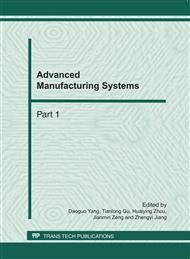[1]
B. Alidaee and N.K. Womer. Scheduling with time dependent processing times: review and extensions. Journal of the Operational Research Society Vol. 50 (1999), pp.711-720.
DOI: 10.1057/palgrave.jors.2600740
Google Scholar
[2]
T.C.E. Cheng, Q. Ding, B.M.T. Lin. A concise survey of scheduling with time-dependent processing times. European Journal of Operational Research Vol. 152 (2004), pp.1-13.
DOI: 10.1016/s0377-2217(02)00909-8
Google Scholar
[3]
S. Browne, U. Yechiali. Scheduling deteriorating jobs on a single processor. Operations Research Vol. 38 (1990), pp.495-498.
DOI: 10.1287/opre.38.3.495
Google Scholar
[4]
G. Mosheiov. V-shaped policies for scheduling deteriorating jobs. Operations Research Vol. 39 (1991), pp.979-991.
DOI: 10.1287/opre.39.6.979
Google Scholar
[5]
G. Mosheiov G (1994). Scheduling jobs under simple linear deterioration. Computers and Operations Research Vol. 21 (1994), pp.653-659.
DOI: 10.1016/0305-0548(94)90080-9
Google Scholar
[6]
C. Zhao, Q. Zhang and H. Tang. Scheduling problems under linear deterioration. Acta Automatica Sinica Vol. 29 (2003), pp.531-535.
Google Scholar
[7]
J. -B. Wang and Z. -Q. Xia. Scheduling jobs under decreasing linear deterioration. Information Processing Letters Vol. 94 (2005), pp.63-69.
DOI: 10.1016/j.ipl.2004.12.018
Google Scholar
[8]
C. -C. Wu, W. -C. Lee and Y. -R. Shiau. Minimizing the total weighted completion time on a single-machine under linear deterioration. International Journal of Advanced Manufacturing Technology Vol. 33 (2007), pp.1237-1243.
DOI: 10.1007/s00170-006-0565-8
Google Scholar
[9]
Y. -R. Shiau, W. -C. Lee, C. -C. Wu and C. -M. Chang. Two-machine flowshop scheduling to minimize mean flow time under simple linear deterioration. International Journal of Advanced Manufacturing Technology Vol. 34 (2007), pp.774-782.
DOI: 10.1007/s00170-006-0646-8
Google Scholar
[10]
M.D. Toksa and E. Guner. Minimizing the earliness/tardiness costs on parallel machine with learning effects and deteriorating jobs: a mixed nonlinear integer programming approach. International Journal of Advanced Manufacturing Technology Vol. 38 (2008).
DOI: 10.1007/s00170-007-1128-3
Google Scholar
[11]
W. -C. Lee, C. -C. Wu and H. -C. Liu. A note on single-machine makespan problem with general deteriorating function. International Journal of Advanced Manufacturing Technology Vol. 40 (2009), pp.1053-1056.
DOI: 10.1007/s00170-008-1421-9
Google Scholar
[12]
T.C.E. Cheng, C. -C. Wu and W. -C. Lee. Some scheduling problems with sum-of-processing-times-based and job-position-based learning effects. Information Sciences Vol. 178 (2008), pp.2476-2487.
DOI: 10.1016/j.ins.2008.02.002
Google Scholar
[13]
T.C.E. Cheng, C. -C. Wu and W. -C. Lee. Some scheduling problems with deteriorating jobs and learning effects. Computers & Industrial Engineering Vol. 54 (2008), pp.972-982.
DOI: 10.1016/j.cie.2007.11.006
Google Scholar
[14]
T.C.E. Cheng, W. -C. Lee, C.C. Wu. Single-machine scheduling with deteriorating functions for job processing times. Applied Mathematical Modelling Vol. 34 (2010), pp.4171-4134.
DOI: 10.1016/j.apm.2010.04.014
Google Scholar
[15]
Z. -L. Chen. Parallel machine scheduling with time dependent processing times. Discrete Applied Mathematics Vol. 70 (1996), pp.81-94.
DOI: 10.1016/0166-218x(96)00102-3
Google Scholar
[16]
Y.C. Hsieh and D.L. Bricker. Scheduling linearly deteriorating jobs on multiple machines. Computers and Industrial Engineering Vol. 32 (1997), pp.727-734.
DOI: 10.1016/s0360-8352(97)00025-9
Google Scholar
[17]
G. Mosheiov. Multi-machine scheduling with linear deterioration. INFOR Vol. 36 (1998), pp.205-214.
DOI: 10.1080/03155986.1998.11732359
Google Scholar
[18]
A. Kononov and S. Gawiejnowicz. NP-hard cases in scheduling deteriorating jobs on dedicated machines. Journal of the Operational Research Society Vol. 52 (2001), pp.708-717.
DOI: 10.1057/palgrave.jors.2601117
Google Scholar
[19]
G. Mosheiov. Complexity analysis of job-shop scheduling with deteriorating jobs. Discrete Applied Mathematics Vol. 117 (2002), pp.195-209.
DOI: 10.1016/s0166-218x(00)00385-1
Google Scholar
[20]
J. -B. Wang and Z. -Q. Xia. Flow shop scheduling with deteriorating jobs under dominating machines. Omega Vol. 34 (2006), pp.327-336.
DOI: 10.1016/j.omega.2004.10.006
Google Scholar
[21]
J. -B. Wang. Flow shop scheduling with deteriorating jobs under dominating machines to minimize makespan. International Journal of Advanced Manufacturing Technology Vol. 48 (2010), pp.719-723.
DOI: 10.1007/s00170-009-2314-2
Google Scholar
[22]
S. Gawiejnowicz. Time-Dependent Scheduling. Springer, Berlin (2008).
Google Scholar
[23]
T.C.E. Cheng, L.Y. Kang and C.T. Ng. Due-date assignment and single machine scheduling with deteriorating jobs. Journal of the Operational Research Society Vol. 55 (2004), pp.198-203.
DOI: 10.1057/palgrave.jors.2601681
Google Scholar
[24]
T.C.E. Cheng, L.Y. Kang and C.T. Ng. Single machine due-date scheduling of jobs with decreasing start-time dependent processing times. International Transactions in Operational Research Vol. 12 (2005), pp.355-366.
DOI: 10.1111/j.1475-3995.2005.501_1.x
Google Scholar
[25]
J. -B. Wang and Q. Guo. A due-date assignment problem with learning effect and deteriorating jobs. Applied Mathematical Modelling Vol. 34 (2010), pp.309-313.
DOI: 10.1016/j.apm.2009.04.020
Google Scholar
[26]
S. -J. Yang, D. -L. Yang and T.C.E. Cheng. Single-machine due-window assignment and scheduling with job-dependent aging effects and deteriorating maintenance. Computers & Operations Research Vol. 37 (2010), pp.1510-1514.
DOI: 10.1016/j.cor.2009.11.007
Google Scholar
[27]
C. -L. Zhao and H. -Y. Tang. A note to due-window assignment and single machine scheduling with deteriorating jobs and a rate-modifying activity. Computers & Operations Research, doi: 10. 1016/j. cor. 2010. 04. 006.
DOI: 10.1016/j.cor.2010.04.006
Google Scholar
[28]
V.S. Gordon, J.M. Porth and C.N. Chu. A survey of the state-of-art of common due date assignment and scheduling research. European Journal of Operational Research Vol. 139 (2002), pp.1-25.
DOI: 10.1016/s0377-2217(01)00181-3
Google Scholar
[29]
P. Brucker. Scheduling Algorithm. Springer-Verlag, Berlin (2004).
Google Scholar


